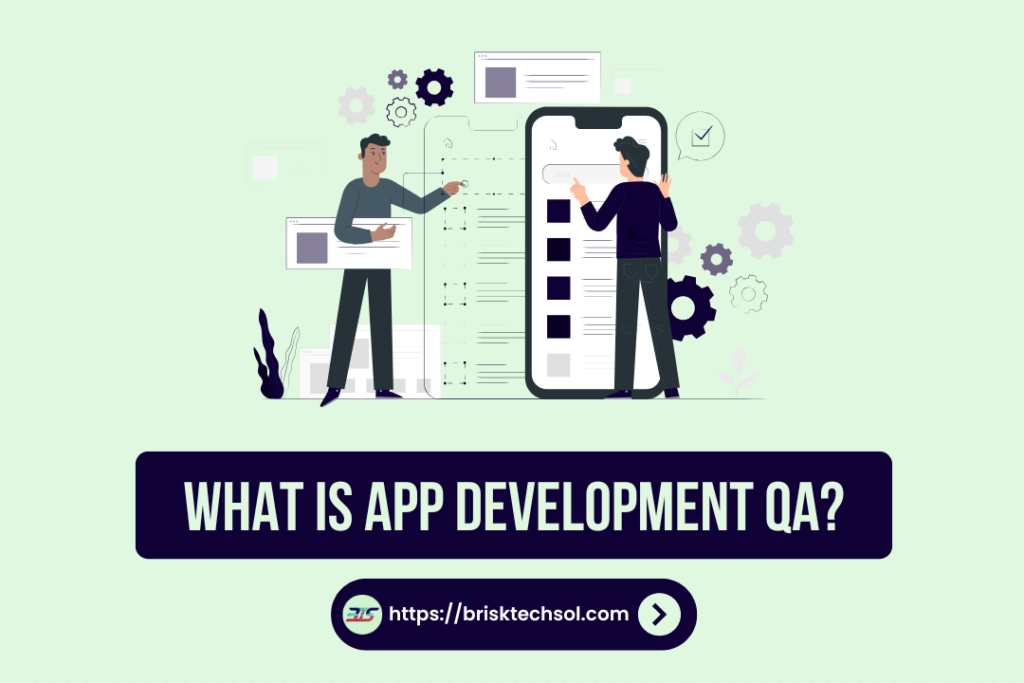App Development QA (Quality Assurance) ensures mobile apps are bug-free, functional, and user-friendly. It involves testing to identify issues early, improving performance and security, and preventing problems before launch for a smoother app release. This guide covers the importance of QA in app development and key testing strategies to ensure a smooth and successful app release.
Key Takeaways
What is App Development QA?
Quality Assurance (QA) in app development is the process of ensuring that a mobile app meets certain standards of quality before it’s released to the market. Unlike quality control (QC), which focuses on detecting and correcting defects in the product, QA is a proactive approach that aims to improve the overall development process by preventing issues before they arise.
QA in app development involves a series of testing phases throughout the app’s lifecycle, from design to launch. These tests are essential for checking whether the app works as intended, is free from bugs, provides a great user experience (UX), and functions seamlessly across multiple devices and operating systems.
Without proper QA, apps can suffer from performance issues, crashes, and security vulnerabilities, leading to user dissatisfaction and even negative reviews.
The Importance of QA in App Development
The importance of QA in mobile app development cannot be overstated. A poor QA process can lead to a myriad of issues, from basic bugs and crashes to more serious security vulnerabilities. Let’s explore why QA is critical:
- Bug Detection: QA ensures that bugs, glitches, and errors are caught early, allowing developers to address them before the app is released to the public.
- Improved Performance: By testing performance under different conditions, such as heavy usage or low network speed, QA ensures that the app performs optimally across a wide range of scenarios.
- Security: Mobile apps are prime targets for hackers. QA teams conduct security testing to ensure that an app is secure from common threats such as data breaches and unauthorized access.
- Better User Experience (UX): QA tests the app’s user interface (UI) and ensures that it’s intuitive and easy to navigate. A poor UX can drive users away, no matter how great the app’s functionality is.
- Increased Customer Satisfaction: With rigorous QA, apps are less likely to suffer from crashes or bugs, ensuring that users enjoy a smooth experience. Happy users are more likely to recommend the app and leave positive reviews.
Key Components of App Development QA
Successful QA in app development is built on several key components. Below are the critical testing types involved in ensuring your app is of the highest quality:
1. Test Planning
Before any testing begins, thorough test planning is essential. This phase involves:
- Defining the testing scope.
- Identifying the types of tests that will be performed.
- Establishing goals, timelines, and resources.
Effective test planning ensures that the QA process is structured and that all aspects of the app are covered.
2. Functional Testing
Functional testing ensures that all features and functions of the app work as expected. This includes testing core features like login, user registration, and transactions. Testers ensure that buttons, links, and other interactive elements perform as intended.
3. Usability Testing
Usability testing evaluates the user interface (UI) and user experience (UX) of the app. Testers assess the app’s ease of use, navigation, and overall user-friendliness. Usability testing is critical to prevent user frustration and abandonment.
4. Performance Testing
Performance testing checks how well an app performs under different conditions, such as varying loads and network speeds. This includes:
- Load Testing: Testing the app’s response under heavy use.
- Stress Testing: Pushing the app beyond its limits to see how it behaves under stress.
- Scalability Testing: Ensuring that the app can scale to accommodate a growing user base.
5. Security Testing
Security is a major concern in mobile app development, especially when handling sensitive data. QA teams conduct security testing to identify vulnerabilities that could expose the app to potential attacks. This includes checking for encryption, data leaks, and ensuring compliance with industry standards.
6. Compatibility Testing
Compatibility testing ensures that the app functions well across a wide range of devices, screen sizes, and operating systems. This is crucial, as mobile users use various devices, such as smartphones, tablets, and different OS versions. Compatibility testing ensures that your app works seamlessly on all of them.
QA Testing Methodologies in App Development
QA in app development can be approached using different testing methodologies. Each has its strengths and is suited to particular types of apps or development stages.
1. Manual Testing
Manual testing involves testers manually interacting with the app to identify bugs and issues. Testers simulate real-world usage scenarios and report any inconsistencies or issues they find. Although it’s time-consuming, manual testing is effective for complex scenarios and ensures real-user interaction is thoroughly tested.
2. Automated Testing
Automated testing uses specialized tools to run tests without human intervention. This methodology is fast, scalable, and highly efficient, especially for repetitive tasks like regression testing. Tools like Selenium and Appium are often used for automating tests, reducing testing time and ensuring consistent results.
3. Exploratory Testing
Exploratory testing is an approach where testers explore the app without predefined scripts. They use their intuition and experience to find bugs or issues that might be missed by other testing methods. This type of testing is often used in the early stages of development or when testing new features.
Challenges in App Development QA
While QA is crucial for mobile app success, it’s not without its challenges. Some common difficulties include:
- Limited Time for Testing: With the constant pressure to release apps quickly, testing can sometimes be rushed, leading to missed issues.
- Device and OS Fragmentation: Testing apps across multiple devices, screen sizes, and operating systems is a complex task that requires a large amount of resources.
- Frequent Updates: Mobile apps often go through rapid iterations, and maintaining high QA standards with frequent updates can be challenging.
- Third-Party Integration: Many apps rely on third-party APIs and libraries, which can introduce unforeseen issues and compatibility problems.
How to Ensure Effective QA in App Development
Ensuring effective QA throughout the app development process is essential for building a high-quality product. Here are some strategies:
- Early Integration: Start QA from the design phase, integrating testing into every part of the development process.
- Continuous Testing: Implement continuous testing to catch issues early. Automation tools can help ensure that tests run regularly and efficiently.
- Feedback Loops: Incorporate feedback from stakeholders and real users throughout the development process to identify areas for improvement.
- Collaboration Between Developers and QA Teams: QA teams and developers should collaborate closely to identify potential issues early and solve them together.
The Future of QA in Mobile App Development
As technology continues to evolve, so do QA methodologies. Some key trends shaping the future of app development QA include:
- AI and Machine Learning: AI-powered tools are revolutionizing testing by automatically detecting bugs and suggesting fixes. Machine learning is also being used to improve test coverage and predict potential issues.
- Cloud-Based Testing: Cloud-based testing platforms are gaining popularity as they allow testers to simulate real-world conditions more easily, from multiple locations, and on a variety of devices.
- IoT and AR/VR Apps: As the Internet of Things (IoT) and augmented/virtual reality (AR/VR) apps become more common, QA will need to adapt to test new technologies and ensure they perform seamlessly across different environments.
Conclusion
App Development QA is an essential process that ensures mobile apps are high-quality, secure, and user-friendly. By incorporating a comprehensive QA strategy throughout the app’s development lifecycle, you can significantly improve your app’s chances of success. Proper QA reduces the risk of bugs, enhances performance, improves UX, and safeguards security all key factors in keeping users happy and ensuring a successful launch.
FAQ Section
1. What is the difference between QA and testing in app development?
QA is a proactive approach to preventing issues throughout the development process, while testing focuses on identifying and fixing problems in the final product.
2. Why is QA important for mobile app performance?
QA ensures that an app performs well under various conditions, preventing issues like crashes, slow load times, and poor responsiveness.
3. How can automated testing improve app development QA?
Automated testing speeds up the QA process, allowing tests to be run frequently and at scale, ensuring that new code doesn’t introduce regressions.
4. What is the role of usability testing in app QA?
Usability testing ensures that the app is intuitive and easy to use, which is critical for user retention and satisfaction.
5. How do I prepare my app for QA testing?
To prepare your app for QA testing, ensure that the app’s features are fully developed and functional, and that documentation for testing is clear and complete.
6. What are the most common QA challenges in mobile app development?
Common QA challenges include limited testing time, device fragmentation, and maintaining high QA standards with frequent updates.
7. How can I ensure my app passes QA testing?
Ensure thorough testing at every stage of development, incorporate feedback loops, and collaborate closely with developers to address issues early.









